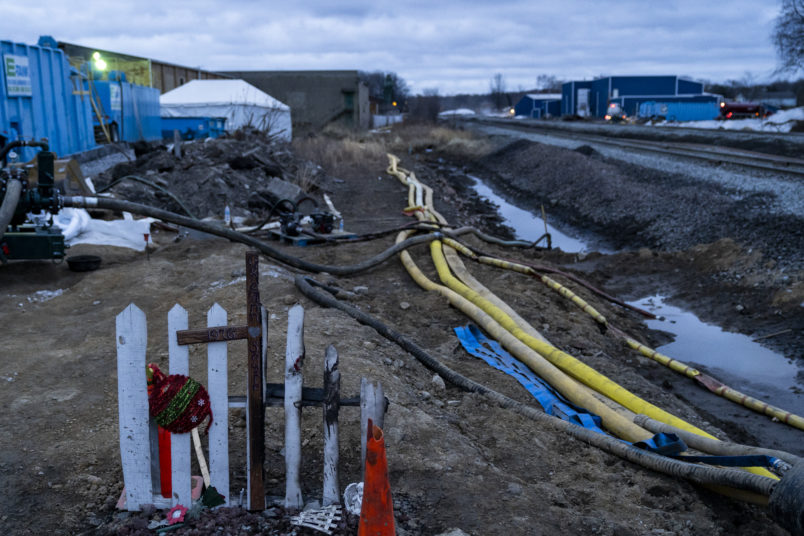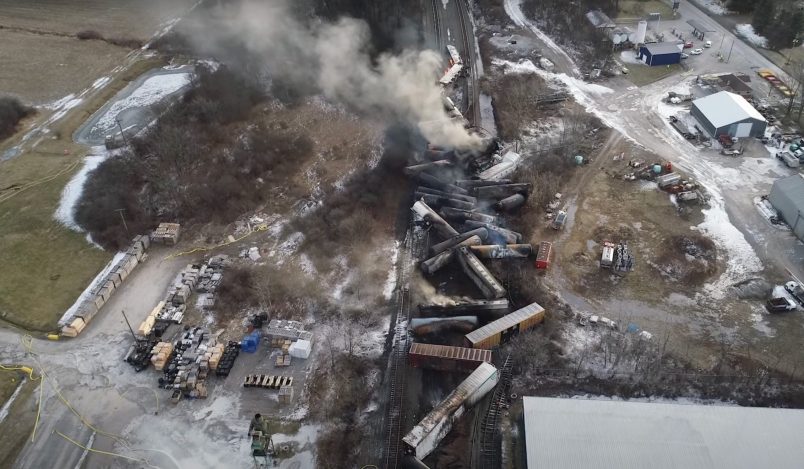This story first appeared at ProPublica. ProPublica is a Pulitzer Prize-winning investigative newsroom. Sign up for The Big Story newsletter to receive stories like this one in your inbox.
Norfolk Southern allows a monitoring team to instruct crews to ignore alerts from train track sensors designed to flag potential mechanical problems.
ProPublica learned of the policy after reviewing the rules of the company, which is engulfed in controversy after one of its trains derailed this month, releasing toxic flammable gas over East Palestine, Ohio.
The policy applies specifically to the company’s Wayside Detector Help Desk, which monitors data from the track-side sensors. Workers on the desk can tell crews to disregard an alert when “information is available confirming it is safe to proceed” and to continue no faster than 30 miles per hour to the next track-side sensor, which is often miles away. The company’s rulebook did not specify what such information might be, and company officials did not respond to questions about the policy.
The National Transportation Safety Board will be looking into the company’s rules, including whether that specific policy played a role in the Feb. 3 derailment in East Palestine. Thirty-eight cars, some filled with chemicals, left the tracks and caught fire, triggering an evacuation and agonized questions from residents about the implications for their health. The NTSB believes a wheel bearing in a car overheated and failed immediately before the train derailed. It plans to release a preliminary report on the accident Thursday morning.
ProPublica has learned that Norfolk Southern disregarded a similar mechanical problem on another train that months earlier jumped the tracks in Ohio.
In October, that train was en route to Cleveland when dispatchers told the crew to stop it, said Clyde Whitaker, Ohio state legislative director for the Transportation Division of the International Association of Sheet Metal, Air, Rail and Transportation Workers, or SMART. He said the help desk had learned that a wheel was heating up on an engine the train was towing. The company sent a mechanic to the train to diagnose the problem.
Whitaker said that it could not be determined what was causing the wheel to overheat, and that the safest course of action would have been to set the engine aside to be repaired. That would have added about an hour to the journey, Whitaker said.
But Whitaker said the dispatcher told the crew that a supervisor determined that the train should continue on without removing the engine.
Four miles later, the train derailed while traveling about 30 miles per hour and dumped thousands of gallons of molten paraffin wax in the city of Sandusky.

Records from the Federal Railroad Administration, the agency responsible for regulating safety in the railroad industry, show that Norfolk Southern identified the cause of the October derailment as a hot wheel bearing. Whitaker said this bearing was on the same engine that originally drew concerns.
A spokesperson for the FRA said the agency’s investigation into the derailment is ongoing. The agency did not say whether it was examining the role of any Norfolk Southern officials in deciding to keep the damaged engine on the train. It’s still unknown what role, if any, the help desk played in the final decision.
This month, 20 miles before Norfolk Southern’s train spectacularly derailed in East Palestine, the help desk should have also gotten an alert. As the train rolled through Salem, it crossed a track-side sensor. Video footage from a nearby Salem company shows the train traveling with a fiery glow underneath its carriage.
If, like the Sandusky train, this one was dangerously heating up, a key question for investigators will be whether the help desk became aware and alerted the crew, and if it did, why the crew was not instructed to stop. The NTSB told ProPublica it is reviewing data from the Salem detector and those before it on the train’s route.
Norfolk Southern declined to say whether members of the train’s crew received an alert before the derailment and, if they did, whether the help desk told them to disregard it. The company did not address questions about its policy giving its help desk leeway to ignore such alerts. A spokesperson said that the company’s detector network is a massive safety investment, and that its trains rarely require troubleshooting.
ProPublica asked officials at the six other large freight railroad companies whether they have similar policies allowing employees to disregard such alerts. CSX and Burlington Northern Santa Fe said they don’t, and Canadian National said that no one can instruct a crew to continue traveling when they receive an alert “requiring them to stop the train.” Union Pacific, Canadian Pacific and Kansas City Southern did not respond.
While some employees and outside experts say there are times in which such policies safely benefit business operations, union officials believe they are emblematic of Precision Scheduled Railroading, the most controversial — and profitable — innovation that’s come out of the country’s seven biggest railroads, the so-called Class 1s, in the last decade. It prioritizes keeping rail cars and locomotives in constant motion.







So obviously it’s Biden fault
Kind of amusing how all the RWNJs are all in a lather because government didn’t get involved enough in this case, innit?
Socializing the Costs, 2.0
And of course if the government had intervened, they’d be screaming about overreach.
I’d love to see all of this hashed out in public hearings (or a public trial), including the details of every override that’s been issued, and the performance reviews of employees who did or didn’t issue those overrides. Need to get management skin in the game.
In the initial hours of this train wreck the company would not tell first responders what chemicals they were dealing with beyond the load of vinyl chloride.
It could be the “controlled burn” was begun before they knew what it was they were dealing with.